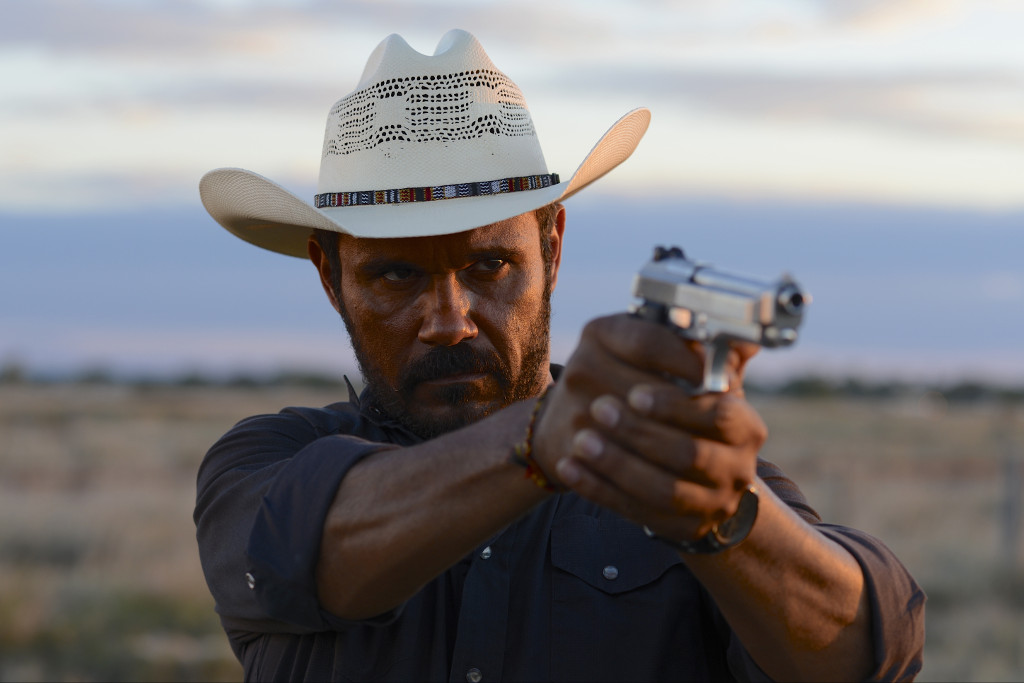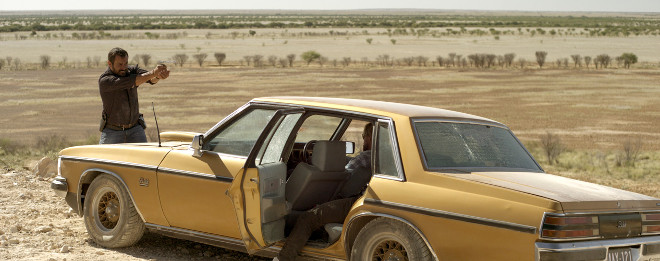Mystery Road’s Hard Home Truths
This exceptional 'outback western' from director Ivan Sen takes a hard-edged detour beyond our country's photogenic facade.

Australia always films well. Its photogenic surface is all high skies and frothy waves and grassy hills. It’s what’s underneath — the frightened country — that evades real cinematic inspection too frequently.
The new film Mystery Road calls bullshit on the homogenic ways mainstream Australia has pictured this country, the land, and contemporary, non-rural Aboriginal communities. It is an outback murder mystery with an Indigenous, cowboy, superman-like cop. Its director, Ivan Sen, is a one-man, writing, directing, shooting, composing and editing miracle man. He sources most of his non-actors from remote mission towns to present rare, troubling visions of an Australia barely seen on film, and he does it with the unique voice and eye of an Indigenous filmmaker.
Detective Jay Swan (Aaron Pedersen) immediately recognises whose body is propped up underneath the highway near Massacre Creek. Throat slit and body mauled by wild dogs, it’s Julie Mason, a very young woman — barely, a girl — from town. To Jay, this murder is personal and brutal, but his Sergeant (Tony Barry) says matter-of-factly, while polishing off an ice-cream, that there’s bugger-all police resources to expend and he’ll have to make do. As Jay is pulled further into the case, it seems everyone in town is complicit in some way: the seriously suss drug detective Johnno (a creepy-as Hugo Weaving), the hostile farmer who doesn’t trust “Abo cops” (malevolently drawn by Ryan Kwanten), and the town’s citizens themselves, who don’t trust Jay either. He’s in a no-man’s land, isolated from his community and struggling against a white police bureaucracy that couldn’t care less.
Without the alcoholic oblivion of Wake In Fright (1971), the sociopathic violence of Wolf Creek (2005), or the idyllic romanticism of Australia (2008), Mystery Road is a rare outback film of lyrical and hard-edged realism. Too often, in film and life, we’ve approached Australia from the outside, and fallen for the way foreigners see us: the wide, idealised country of flat red hills, and the raucous, lovable pub-world of Paul Hogan and Steve Irwin. That’s rubbish, and anyone who’s spent substantial time living and working outside the city knows it. On the flipside, when we don’t picture Australia as a kooky, down-under Eden, we film it as a monstrous landscape that consumes and violates its victims, as in the newer wave of outdoor horror films like Rogue (2007) and Blackwater (2007).
Mystery Road’s landscape is not a mythic, tourism-board backdrop; it’s a character. Nor is the land a hostile idea, as in Picnic At Hanging Rock (1975); it’s an active force that feeds Jay clues when he listens. It’s not a place to be tamed, either; it’s a key to identity. When it comes to offering a cultural perspective on racial tensions and our rattled relationship with the earth and the sky and the air, director Sen does not shy away from complexity. And though he refuses to dichotomise or draw mythic lines in the red sand, his open-endedness is never fuzzy.
Let’s be frank: there are parts of contemporary Australian life that are deeply ugly. Sen’s camera looks straight on at industry-less, jobless sections of Australia — often former missions — where women engage in ‘transactional sex‘ to buy food, grog, drugs and cigarettes, and where brutal murders of Indigenous people are allocated minimal police resources. In doing this, what Sen really does is turn the lens on the country that has allowed these conditions to continue. Mainstream Australia has shruggingly accepted this as the norm. It’s this realisation of Australian culture at its most cavalier that makes Mystery Road so confronting. Sen, an exceptionally watchful filmmaker, has crafted a film with a sharp moral intelligence about the things that should matter more to this frightened country. That’s what artists do. Home truths are the hardest.
But Sen’s not here to preach; he’s masterful at balancing politics with pure storytelling. This is a devastatingly suspenseful and beautiful genre film, which slow-burns towards a staggering gunfight finale that will make your heart beat big and fast. Pedersen is a magnet on screen, revealing depth, radiating charisma and giving us a character whose sorrow and determination leap far beyond the expected lone cop or black tracker archetypes. I wondered why he’s not a bigger star, and eventually tore my eyes away from the final scene with a new appreciation for him and his director. Together, they’ve made a film that exists in the same twilight world as Jay: between crime genre and verite observation, colonial past and present, hardship and hope.
–
Mystery Road is now showing in cinemas nationally.
–
Lauren Carroll Harris is a writer and artist. She does research at UNSW on the Australian film industry and distribution. Her forthcoming publication, ‘Not at a Cinema Near You: Australia’s Film Distribution Problem’, is out through Currency House on November 1.
